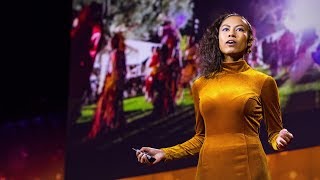(单词翻译:单击)
When I was four years old, my dad taught me the Taos Pueblo Hoop Dance,
当我四岁时,我爸爸教我陶斯普韦布洛环圈舞,
a traditional dance born hundreds of years ago in Southwestern USA.
这是种美国西南部的传统舞蹈,有数百年的历史。
A series of hoops are created out of willow wood,
用柳木制造一系列的环圈,
and they're threaded together to create formations of the natural world, showing the many beauties of life.
穿在一起,创造出自然世界的排列,展现人生的许多美丽。
In this dance, you're circling in a constant spin, mimicking the movement of the Sun and the passage of time.
在这种舞蹈中,你会持续地旋转,模仿太阳的运转以及时间的推移。
Watching this dance was magic to me.
这种舞蹈让我看得非常入迷。
Like with a time capsule, I was taking a look through a cultural window to the past.
就像用时间胶囊,我透过一扇文化窗户看过往。
I felt a deeper connection to how my ancestors used to look at the world around them.
我感受到深刻的连结,连结到我的祖先以前如何看待他们周遭的世界。
Since then, I've always been obsessed with time capsules.
那之后,我就一直对时间胶囊很着迷。
They take on many forms, but the common thread is that they're uncontrollably fascinating to us as human beings,
它们有许多形式,但共同点是,对我们人类而言,它们都有着无法控制的迷人,
because they're portals to a memory, and they hold the important power of keeping stories alive.
因为它们是通往记忆的入口,具有能让故事持续的重要力量。
As a filmmaker and composer, it's been my journey to find my voice,
身为电影制作人以及作曲家,我的旅程一直是要找到自己的声音,
reclaim the stories of my heritage and the past and infuse them into music and film time capsules to share.
取回关于我的传承和过去的故事,将它们注入到音乐和电影的时间胶囊中来分享。
To tell you a bit about how I found my voice, I'd like to share a bit about how I grew up.
为了告诉各位我是如何找到自我的声音的,我想要先分享一些我的成长过程。
In Southern California, I grew up in a multigenerational home,
在南加州,我在一个多世代的家庭中长大,
meaning I lived under the same roof as my parents, aunts, uncles and grandparents.
意思是和我同住一个屋檐下的有我的父母、姑姨叔伯及祖父母。
My mother is Dutch-Indonesian and Chinese with immigrant parents,
我妈妈是荷属印度尼西亚和中国血统,她的父母都是移民,
and my father is Ojibwe and an enrolled tribal member of the Prairie Band's Potawatomi Tribe in Northeastern Kansas.
我爸爸是欧及布威族,且被登记为堪萨斯东北的草原湾坡塔托米部落的成员。
So one weekend I'd be learning how to fold dumplings,
我会在一个周末学习如何捏饺子,
and the next, I'd be traditional-style dancing at a powwow, immersed in the powerful sounds of drums and singers.
下一个周末又在欢庆会上跳传统舞蹈,沉浸在强大的鼓声和歌声中。
Being surrounded by many cultures was the norm, but also a very confusing experience.
被许多种文化围绕是很正常的,却也是让我很困惑的经历。
It was really hard for me to find my voice,
我真的很难找到我的声音,
because I never felt I was enough -- never Chinese, Dutch-Indonesian or Native enough.
因为我从来不觉得我是足够的,我从来就不够中国、不够荷属印度尼西亚、不够原住民。
Because I never felt I was a part of any community,
因为我从来不觉得我是任何社群的一部分,
I sought to learn the stories of my heritage and connect them together to rediscover my own.
我寻求了解我的传承的故事,将它们连结在一起,来重新发现我自己。
The first medium I felt gave me a voice was music.
第一个让我感到能给我声音的媒介是音乐。
With layers of sounds and multiple instruments, I could create soundscapes and worlds that were much bigger than my own.
用声音的层次和多种乐器,我能创造出远远大于自己的音景以及世界。
Through music, I'm inviting you into a sonic portal of my memories and emotions, and I'm holding up a mirror to yours.
透过音乐,我邀请你们进入一个声音的入口,通往我的记忆和情绪当中,而我正拿着一面镜子来反映你的。

One of my favorite instruments to play is the guzheng zither, a Chinese harp-like instrument.
我最喜欢演奏的一个乐器是古筝,一种很像竖琴的中国乐器。
While the hoop dance is hundreds of years old, the guzheng has more than 2,000 years of history.
虽然环圈舞有数百年的历史,但古筝的历史至少有两千年。
I'm playing the styles that greatly influence me today, like electronic music,
我演奏的是现今对我影响很大的风格,像电子音乐,
with an instrument that was used to play traditional folk music long ago.
但用的是很久以前演奏传统民俗音乐的乐器。
And I noticed an interesting connection: the zither is tuned to the pentatonic scale,
我注意到一个有趣的连接:古筝是根据五声音阶来调音的,
a scale that is universally known in so many parts of music around the world, including Native American folk songs.
这种音阶在全世界许多音乐中都被普遍使用,包括美国原住民的民俗歌曲。
In both Chinese and Native folk, I sense this inherent sound of longing and holding onto the past,
在中国和原住民民俗中,我都能感觉到一种内在固有的声音,在渴望着、紧抓着过去,
an emotion that greatly drives the music I create today.
这种情绪是我现今音乐创作背后极大的动力。
At the time, I wondered if I could make this feeling of immersion even more powerful,
当时,我在想我是否能让这种沉浸的感觉更强大些,
by layering visuals and music -- visuals and images on top of the music.
透过将视觉和音乐层迭起来,把视觉和影像放在音乐的上面。
So I turned to internet tutorials to learn editing software, went to community college to save money and created films.
所以我上网找教学资源,学会使用编辑软件,为了省钱而上社区学院并创作电影。
After a few years experimenting, I was 17 and had something I wanted to tell and preserve.
经过几年的实验,当我十七岁时,我有了想说和想要保存的东西。
It started with a question: What happens when a story is forgotten?
它始于一个问题:当一个故事被遗忘之后,会发生什么事?
I lead with this in my latest documentary film, "Smoke That Travels,"
我就用这个问题来引领我最新的纪录片《旅行的烟》,
which immerses people into the world of music, song, color and dance,
它让人们沉浸在音乐、歌曲、颜色及舞蹈的世界中,
as I explore my fear that a part of my identity, my Native heritage, will be forgotten in time.
我同时在探索我的恐惧,害怕我部分的身份和原住民传承会在时间长河中被遗忘。
Many indigenous languages are dying due to historically forced assimilation.
许多原住民语言正在消逝中,原因是历史中的强迫同化。
From the late 1800s to the early 1970s, Natives were forced into boarding schools,
从十九世纪末到二十世纪七十年代初期,原住民被迫进入寄宿学校,
where they were violently punished if they practiced traditional ways or spoke their native language,
在那里,如果他们使用传统做法或是说母语,他们会受到暴力惩罚,
most of which were orally passed down.
而传统做法或母语大多得靠口头传下去。
As of now, there are 567 federally recognized tribes in the United States, when there used to be countless more.
到目前为止,美国有567个联邦承认的部落,以前的数目多很多。
In my father's words, "Being Native is not about wearing long hair in braids. It's not about feathers or beadwork.
引用我父亲的说法:“身为原住民的重点并不是绑长发辫,也不是羽毛或是珠饰细工。
It's about the way we all center ourselves in the world as human beings."
而是我们身为人类生活于世界中的样式。”
After traveling with this film for over a year, I met indigenous people from around the world,
为了这部电影旅行了一年多之后,我遇到了来自世界各地的原住民,
from the Ainu of Japan, Sami of Scandinavia, the Maori and many more.
有来自日本的阿伊努人、斯堪的那维亚的萨米人、毛利人,还有许多其他的。
And they were all dealing with the exact same struggle to preserve their language and culture.
他们在保存他们的语言和文化上,也都在面对同样的难处。
At this moment, I not only realize the power storytelling has to connect all of us as human beings
此刻,我不只了解到说故事的力量可以把我们人类连结在一起,
but the responsibility that comes with this power.
也了解到这力量所伴随的责任。
It can become incredibly dangerous when our stories are rewritten or ignored,
如果我们的故事被改写或是忽略,可能会变得相当危险,
because when we are denied identity, we become invisible. We're all storytellers.
因为当我们的身份被否认,我们就变成隐形的了。我们都是说故事的人。
Reclaiming our narratives and just listening to each other's can create a portal that can transcend time itself. Thank you.
重新找回我们的故事并倾听彼此的故事,就能创造一个入口,能超越时间本身的入口。谢谢。


